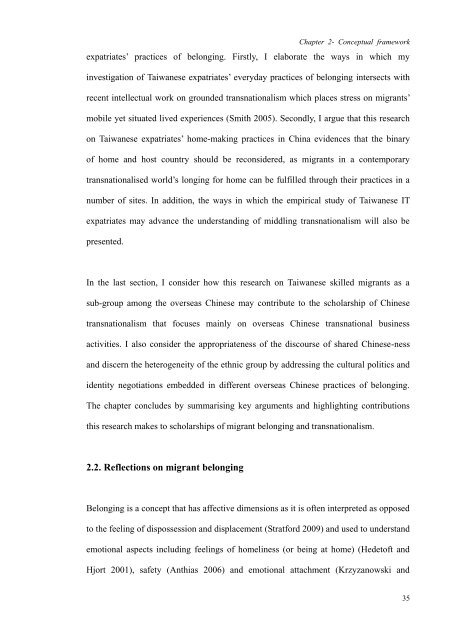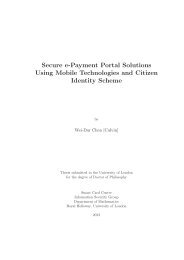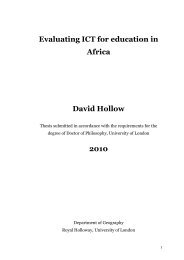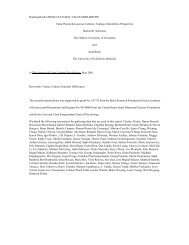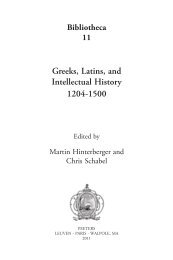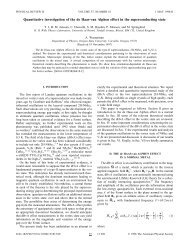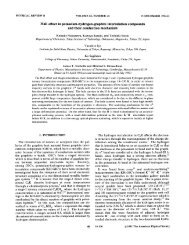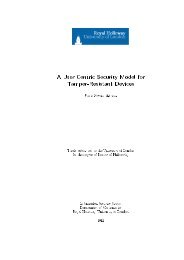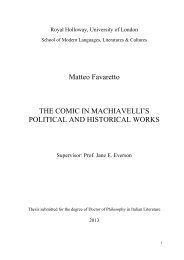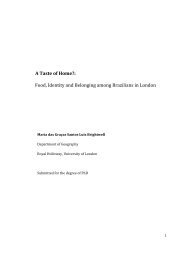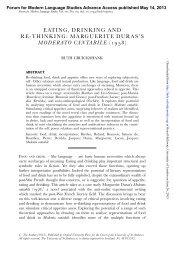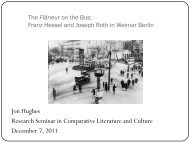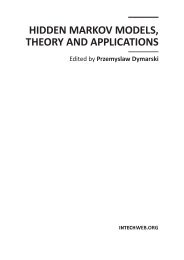- Page 2 and 3: DeclarationI, Yuhui Cheng, confirm
- Page 6 and 7: 7.4. Concluding remarks and directi
- Page 8 and 9: LIST OF FIGURES AND TABLESFigure 2.
- Page 10 and 11: GLOSSARYAlishanA YiChu wai renDa di
- Page 12 and 13: encouragement and support from all
- Page 14 and 15: 1.1. IntroductionChapter1- Introduc
- Page 16 and 17: Chapter1- Introductiontheir actions
- Page 18 and 19: Chapter1- IntroductionThe above dis
- Page 20 and 21: Chapter1- Introductionmigrants‘ i
- Page 22 and 23: Chapter1- Introductionforces occurr
- Page 24 and 25: Chapter1- Introductionarea due to t
- Page 26 and 27: Chapter1- Introduction2008; Nowicka
- Page 28 and 29: Chapter1- Introductionto that of ot
- Page 30 and 31: Chapter1- Introductionlinks, the tr
- Page 32 and 33: Chapter1- Introductionresearch meth
- Page 36 and 37: Chapter 2- Conceptual frameworkWoda
- Page 38 and 39: Chapter 2- Conceptual frameworkSpac
- Page 40 and 41: Chapter 2- Conceptual frameworkinst
- Page 42 and 43: Chapter 2- Conceptual frameworkthro
- Page 44 and 45: Chapter 2- Conceptual frameworkGive
- Page 46 and 47: Chapter 2- Conceptual frameworkleis
- Page 48 and 49: Chapter 2- Conceptual frameworkacti
- Page 50 and 51: Chapter 2- Conceptual frameworkspac
- Page 52 and 53: Chapter 2- Conceptual frameworkcurr
- Page 54 and 55: Chapter 2- Conceptual frameworkwith
- Page 56 and 57: Chapter 2- Conceptual frameworkmigr
- Page 58 and 59: Chapter 2- Conceptual frameworkGord
- Page 60 and 61: Chapter 2- Conceptual frameworkLite
- Page 62 and 63: Chapter 2- Conceptual frameworkare
- Page 64 and 65: Chapter 2- Conceptual frameworkThis
- Page 66 and 67: Chapter 2- Conceptual frameworkThis
- Page 68 and 69: 3.1. IntroductionChapter 3- Researc
- Page 70 and 71: Chapter 3- Research contexts and me
- Page 72 and 73: Chapter 3- Research contexts and me
- Page 74 and 75: Chapter 3- Research contexts and me
- Page 76 and 77: Chapter 3- Research contexts and me
- Page 78 and 79: Chapter 3- Research contexts and me
- Page 80 and 81: Chapter 3- Research contexts and me
- Page 82 and 83: Chapter 3- Research contexts and me
- Page 84 and 85:
Chapter 3- Research contexts and me
- Page 86 and 87:
Chapter 3- Research contexts and me
- Page 88 and 89:
Chapter 3- Research contexts and me
- Page 90 and 91:
Chapter 3- Research contexts and me
- Page 92 and 93:
Chapter 3- Research contexts and me
- Page 94 and 95:
Chapter 3- Research contexts and me
- Page 96 and 97:
Chapter 3- Research contexts and me
- Page 98 and 99:
Chapter 3- Research contexts and me
- Page 100 and 101:
Chapter 3- Research contexts and me
- Page 102 and 103:
Chapter 3- Research contexts and me
- Page 104 and 105:
Chapter 4- Home, domesticity and be
- Page 106 and 107:
Chapter 4- Home, domesticity and be
- Page 108 and 109:
Chapter 4- Home, domesticity and be
- Page 110 and 111:
Chapter 4- Home, domesticity and be
- Page 112 and 113:
Chapter 4- Home, domesticity and be
- Page 114 and 115:
Chapter 4- Home, domesticity and be
- Page 116 and 117:
Chapter 4- Home, domesticity and be
- Page 118 and 119:
Chapter 4- Home, domesticity and be
- Page 120 and 121:
Chapter 4- Home, domesticity and be
- Page 122 and 123:
Chapter 4- Home, domesticity and be
- Page 124 and 125:
Chapter 4- Home, domesticity and be
- Page 126 and 127:
Chapter 4- Home, domesticity and be
- Page 128 and 129:
Chapter 4- Home, domesticity and be
- Page 130 and 131:
Chapter 4- Home, domesticity and be
- Page 132 and 133:
Chapter 4- Home, domesticity and be
- Page 134 and 135:
Chapter 4- Home, domesticity and be
- Page 136 and 137:
Chapter 4- Home, domesticity and be
- Page 138 and 139:
Chapter 4- Home, domesticity and be
- Page 140 and 141:
Chapter 4- Home, domesticity and be
- Page 142 and 143:
Chapter 4- Home, domesticity and be
- Page 144 and 145:
Chapter 4- Home, domesticity and be
- Page 146 and 147:
Chapter 4- Home, domesticity and be
- Page 148 and 149:
Chapter 4- Home, domesticity and be
- Page 150 and 151:
parents in law‘ (Joyce) and feel
- Page 152 and 153:
Chapter 4- Home, domesticity and be
- Page 154 and 155:
Chapter 4- Home, domesticity and be
- Page 156 and 157:
Chapter 4- Home, domesticity and be
- Page 158 and 159:
Chapter 4- Home, domesticity and be
- Page 160 and 161:
Chapter 4- Home, domesticity and be
- Page 162 and 163:
Chapter 4- Home, domesticity and be
- Page 164 and 165:
Chapter 4- Home, domesticity and be
- Page 166 and 167:
Chapter 4- Home, domesticity and be
- Page 168 and 169:
Chapter 5 - Workplace belongingChap
- Page 170 and 171:
Chapter 5 - Workplace belongingemer
- Page 172 and 173:
Chapter 5 - Workplace belongingthe
- Page 174 and 175:
Chapter 5 - Workplace belongingprev
- Page 176 and 177:
Chapter 5 - Workplace belongingthe
- Page 178 and 179:
Chapter 5 - Workplace belongingthat
- Page 180 and 181:
Chapter 5 - Workplace belongingbusi
- Page 182 and 183:
Chapter 5 - Workplace belongingtran
- Page 184 and 185:
Chapter 5 - Workplace belongingAs s
- Page 186 and 187:
Chapter 5 - Workplace belongingthem
- Page 188 and 189:
Chapter 5 - Workplace belongingcont
- Page 190 and 191:
Chapter 5 - Workplace belongingensu
- Page 192 and 193:
Chapter 5 - Workplace belongingface
- Page 194 and 195:
Chapter 5 - Workplace belongingdeve
- Page 196 and 197:
Chapter 5 - Workplace belongingYuhu
- Page 198 and 199:
Chapter 5 - Workplace belongingwhic
- Page 200 and 201:
Chapter 5 - Workplace belongingshap
- Page 202 and 203:
Chapter 5 - Workplace belongingAlth
- Page 204 and 205:
Chapter 5 - Workplace belongingaddi
- Page 206 and 207:
Chapter 5 - Workplace belongingthey
- Page 208 and 209:
Chapter 5 - Workplace belongingsupp
- Page 210 and 211:
6.1. IntroductionChapter 6 -Groundi
- Page 212 and 213:
Chapter 6 -Grounding belonging in l
- Page 214 and 215:
Chapter 6 -Grounding belonging in l
- Page 216 and 217:
Chapter 6 -Grounding belonging in l
- Page 218 and 219:
Chapter 6 -Grounding belonging in l
- Page 220 and 221:
Chapter 6 -Grounding belonging in l
- Page 222 and 223:
Chapter 6 -Grounding belonging in l
- Page 224 and 225:
Chapter 6 -Grounding belonging in l
- Page 226 and 227:
Chapter 6 -Grounding belonging in l
- Page 228 and 229:
Tai gan living quarters:Chapter 6 -
- Page 230 and 231:
Chapter 6 -Grounding belonging in l
- Page 232 and 233:
Chapter 6 -Grounding belonging in l
- Page 234 and 235:
Chapter 6 -Grounding belonging in l
- Page 236 and 237:
Chapter 6 -Grounding belonging in l
- Page 238 and 239:
Chapter 6 -Grounding belonging in l
- Page 240 and 241:
Chapter 6 -Grounding belonging in l
- Page 242 and 243:
Chapter 6 -Grounding belonging in l
- Page 244 and 245:
Chapter 6 -Grounding belonging in l
- Page 246 and 247:
Chapter 6 -Grounding belonging in l
- Page 248 and 249:
7.1. IntroductionChapter7- Conclusi
- Page 250 and 251:
Chapter7- Conclusionthe interaction
- Page 252 and 253:
Chapter7- Conclusioninclude famous
- Page 254 and 255:
Chapter7- Conclusionlandscape). Fur
- Page 256 and 257:
Chapter7- Conclusionan account vast
- Page 258 and 259:
Chapter7- Conclusionscholarship of
- Page 260 and 261:
(practices of) belonging.Chapter7-
- Page 262 and 263:
Chapter7- ConclusionConfidentiality
- Page 264 and 265:
Chapter7- Conclusionplaces in the f
- Page 266 and 267:
Chapter7- ConclusionThe focus on th
- Page 268 and 269:
BibliographyS. and Hall, G. J. New
- Page 270 and 271:
BibliographyChen, J. H. 2009. A Glo
- Page 272 and 273:
BibliographyDittmer, L. 2004. Taiwa
- Page 274 and 275:
BibliographyVillas in Shanghai. In
- Page 276 and 277:
Bibliography22 (5-6):120-128.Iredal
- Page 278 and 279:
BibliographyLeng, T. K. 2002. Econo
- Page 280 and 281:
Bibliographyand Belonging in Small
- Page 282 and 283:
Bibliography———. 2003. Family
- Page 284 and 285:
BibliographyValentine, G. 1999. Doi
- Page 286 and 287:
BibliographyYang, M. M. 2002. The R
- Page 288 and 289:
Wendy early30s F Single Master IT e
- Page 290 and 291:
AppendicesWilliam early40s M Marrie
- Page 292:
Appendices5. Do you have to keep in


